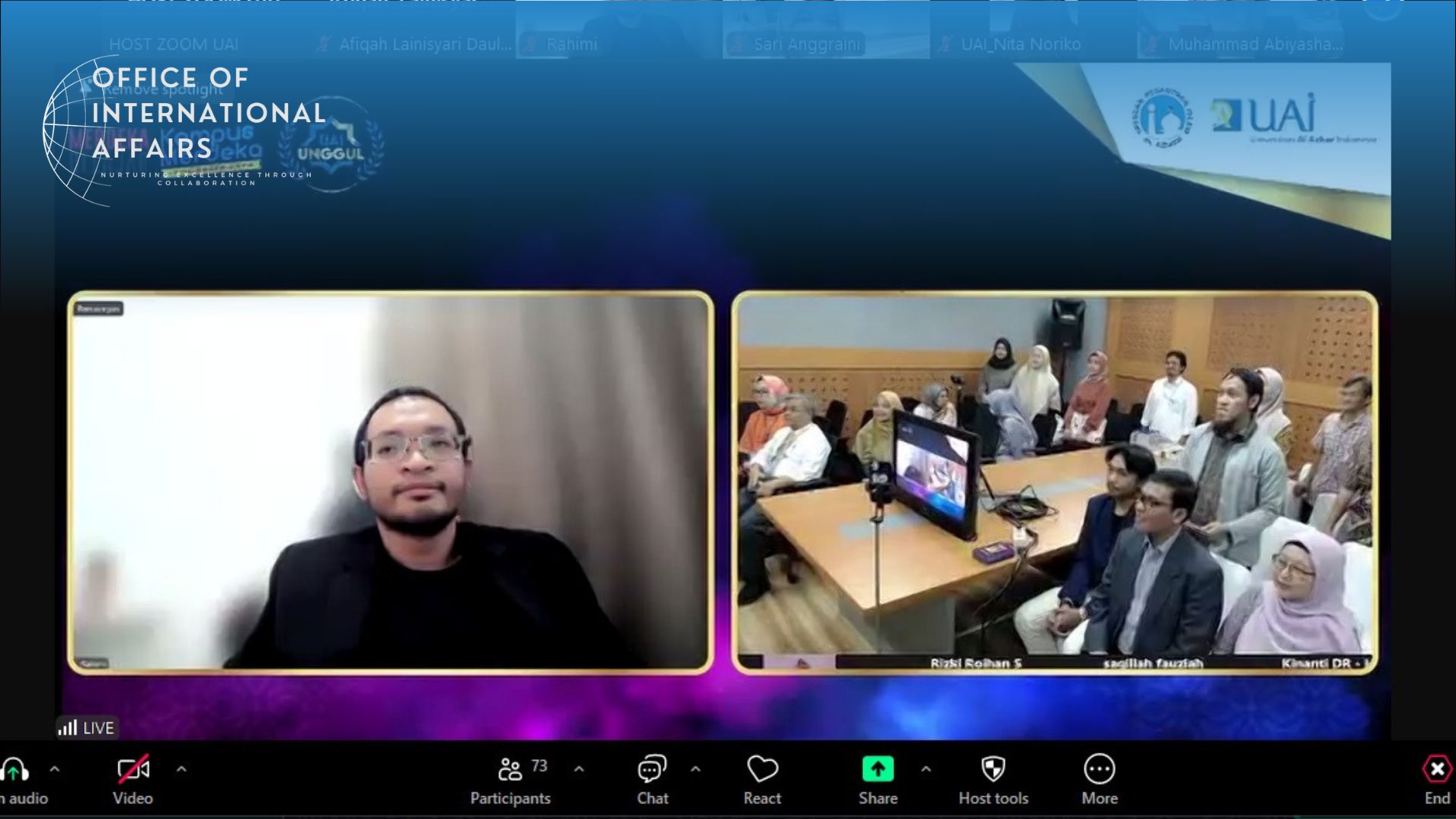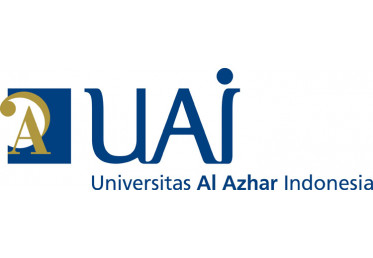To strengthen collaboration between Tomsk State University (TSU), Russia, and Universitas Al-Azhar Indonesia (UAI), several key initiatives were undertaken. These included hosting an International Seminar on July 11th, 2024, and formalizing agreements such as the signing of a Memorandum of Understanding (MoU) between TSU (represented by Prof. Rykun, Vice Rector for International Relations) and UAI (led by Prof. Asep, Rector of UAI) on July 12th, 2024. Additionally, a Memorandum of Agreement (MoA) was established between TSU and four faculties of UAI, including Faculty of Social and Political Science, Faculty of Humanities, Faculty of Economics and Business, and Faculty of Science and Technology.

International Seminar: Identifying the implications of AI for the best future (UAI – UiTM – TSU)



During the international seminar, that held the titled “Artificial Intelligent and Its Implication on Sustainable Development”, on July 11th, 2024, Prof. Dr. Ir. Asep, M.Sc., the Rector of UAI, in his opening remarks, emphasized the inevitability of Artificial Intelligence (AI) integration in society:

“We cannot evade the influence of AI. It is crucial, especially for students, to comprehend its implications. AI possesses the capability to harm humans, diminish cognitive abilities, and impact ecosystems. Hence, its utilization must be approached cautiously, as human decision-making cannot match the speed of AI.”

On July 11th, 2024, the seminar was chaired by Yuherina Gusman, Ph.D., and featured presentations by two distinguished speakers: Dr. Mohamad Rahimi bin Mohamad Rosman from Universiti Teknologi Mara, Malaysia, and Dr. Winangsari Pradani from Universitas Al-Azhar Indonesia. Meanwhile, Prof. Rykun delivered his presentation on July 12th, 2024, in the same venue.


Dr. Rahimi elaborated on the transformative potential of AI in accessing and utilizing information. He emphasized the importance of acquiring knowledge to effectively harness AI’s capabilities. While acknowledging AI’s ability to streamline processes and provide efficiencies, Dr. Rahimi cautioned against over-reliance on AI, noting its limitations in fostering critical thinking and intellectual growth in younger generations. He highlighted the dual nature of AI, which while potentially displacing jobs, also opens new avenues for innovation and creativity.

Dr. Winangsari Pradani focused on the preservation of cultural heritage and the role of AI in this context. She underscored the invaluable benefits of integrating AI technologies to enhance the accessibility and understanding of cultural artifacts and traditions. Dr. Pradani pointed out the current challenge of inadequate digital documentation of cultural heritage, which hampers awareness and appreciation among youth.
This international seminar represents a significant step in implementing the collaboration between Universitas Al-Azhar Indonesia (UAI), Universiti Teknologi Mara (UiTM), and Tomsk State University (TSU). By bringing together scholars and experts from these esteemed institutions, the seminar aims not only to strengthen academic ties but also to enhance the global visibility and reputation of each institution, contributing to the advancement of education and research on an international scale.
In conclusion, both speakers emphasized the pivotal role of AI in shaping sustainable development and cultural preservation efforts. Their presentations underscored the importance of thoughtful integration and ethical considerations in harnessing AI’s potential to benefit society at large.
Signing MoA & MoU, and Studium Generale with Tomsk State University


Continuing on July 12, 2024, the studium generale featured a compelling presentation titled “EdTech Products for Quality Education” by Prof. Rykun from Tomsk State University. The session delved into the innovative educational technology (EdTech) products developed at his university, examining their advantages and the obstacles they present.


Prof. Rykun highlighted the transformative potential of Artificial Intelligence (AI) products within educational contexts. These AI technologies, he explained, are designed not only to enhance student abilities and deepen knowledge but also to bolster workforce skills and facilitate more efficient learning processes. Moreover, they play a crucial role in managing educational systems and promoting proficiency in foreign languages.
However, amidst the advancements, Prof. Rykun also raised a pertinent concern. He noted that while AI can significantly augment educational outcomes, there is a risk that over-reliance on technology may diminish human cognitive engagement and the intrinsic motivation to learn and develop personal.
Following Prof. Rykun’s insightful presentation, Mr. Ghozali moderated a dynamic Q&A session that engaged participants with diverse queries, that are : Mr. Firman Alamsyah, S.Si., M.Si., Ph.D., Head of the Biology Department, expressed interest in fostering educational and research collaborations with TSU; Dr. Heri Herdiawanto, S.Pd., M.Si., Dean of the Faculty of Social and Political Science, sought insights into integrating character development with academic competencies in the curriculum; Additionally, Nurfadilah, S.Psi., M.Psi., Secretary of the Early Childhood Education Department (PGPAUD), raised pertinent questions about leveraging AI for counseling services and opportunities for student scholarships. These discussions underscored the event’s focus on advancing educational innovation and fostering international cooperation between Universitas Al-Azhar Indonesia and Tomsk State University.



After the informative presentation, the session continued with the signing of Memoranda of Agreement (MoA) between Tomsk State University and four faculties of Universitas Al-Azhar Indonesia: Faculty of Social and Political Sciences, Faculty of Humanities, Faculty of Economics and Business, and Faculty of Science and Technology.
This signing of Memoranda of Agreement (MoA) between Universitas Al-Azhar Indonesia (UAI), and Tomsk State University (TSU) marks a pivotal starting point for future collaborations in education, research, and community service. These agreements leverage the expertise and resources of each institution’s faculties, enabling joint initiatives that address global challenges and promote sustainable development. By pooling their strengths in various disciplines, including social sciences, humanities, economics, business, science, and technology, the institutions aim to foster innovative solutions and create impactful outcomes that benefit local and international communities. This strategic partnership underscores a commitment to academic excellence and mutual learning, laying the groundwork for long-term cooperation and meaningful contributions to society.


Continuing the agenda at the rector’s office, the day proceeded with the signing of a Memorandum of Understanding (MoU) between Tomsk State University, represented by Prof. Rykun, Vice Rector for International Relations, and Universitas Al-Azhar Indonesia, represented by Prof. Asep, Rector of UAI. This significant agreement marks a commitment to enhancing institutional ties, promoting international cooperation, and exploring new avenues for academic and research collaboration between the two esteemed universities.
Overall, all the sessions throughout the event emphasized the pivotal role of responsibly harnessing technological advancements in education. They underscored the continuous need for human-centered learning in adapting to the evolving landscape of AI and EdTech. Furthermore, they stressed the importance of utilizing AI to enhance individual capabilities, advocating for a balanced approach that integrates technological tools with human ingenuity and development. This collaborative approach ensures that technological innovations such as AI support and amplify human skills and knowledge rather than replace them. The event as a whole served as a platform to strengthen collaboration and promote sustainable partnerships between institutions. (DA)

